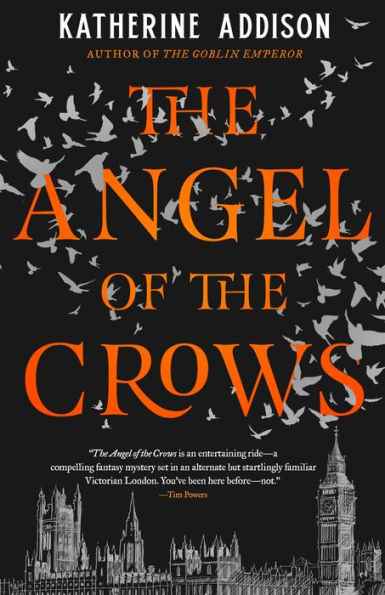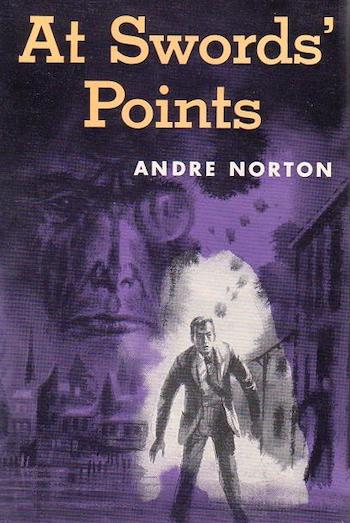The third installment of Andre Norton’s World War II spy thriller series was published in 1954, and is set in more or less that year. The war had officially ended nearly a decade before, but the conflict between Allies and Nazis was far from over. Open warfare had given way to secret battles and undercover operations, with Allied agents going up against Nazi renegades.
Once again we encounter Lorens Van Norreys and his ancient house of jewelers, but this time he plays little direct role in the action. Norton rather summarily sidelines him with a skiing accident, and gives the story to a young American, Quinn Anders. Quinn is a budding medieval scholar, following in his late father’s footsteps, and he needs Lorens’ help to track down his missing brother, Stark. Stark is mysteriously dead in a quest for the treasure on which their father’s final book was based, and the House of Norreys has laid claim to the artifacts, a set of jeweled figurines called the Bishop’s Menie.
Young Quinn is not a prepossessing person, but he is determined, and though it’s not quite made explicit, his nondescript appearance is a great asset for a secret agent. He manages to convince Lorens to put him in touch with certain persons in the Netherlands, who may be able to lead him to the treasure and help him solve the mystery of Stark’s death. Two familiar persons speak up for him: Lawrence Kane and Sam Marusaki.
Sam doesn’t show up in Europe, but Kane does. It’s an entrance exam of sorts for a very secret organization that hunts down Axis renegades and repatriates stolen treasure. Quinn follows cryptic clues to odd and outré places and people (including a remarkably intelligent black cat and a fascinating lady who looks exactly like Queen Elizabeth I), narrowly escapes maiming and death, and convinces himself that he is completely unfit to be a secret agent. He also helps find the Menie and plays a role in the discovery of the long-lost heir to the treasure.
It’s a headlong, rapid-fire adventure in the classic Norton style, and the protagonist is classic Norton, too: late teens, male, orphaned, and disabled. Quinn is a polio survivor, and he has a weak leg that causes him considerable trouble and nearly spikes the mission to find the treasure. But he is plucky and smart and he seldom gives up, and he does his best, even when that isn’t quite enough.
Buy the Book


The Angel of the Crows
I don’t think most people now realize how pervasive polio was in the decades around World War II. When Norton wrote At Swords’ Points, a vaccine had just been developed, and that development was huge. Poliomyelitis, also known as infantile paralysis, was horribly contagious, and it ran through the population in waves from 1894 onward. Most people who caught it recovered, but for all too many, it caused various levels of paralysis, from a weak leg like Quinn’s to life in a wheelchair like President Franklin Roosevelt, to full paraplegia. For some, survival meant life in a breathing machine called an iron lung.
It was an awful disease, and it was as much of a part of life at the time as near-universal tobacco use. As quaint as both of these may seem now, reading this novel in the midst of the pandemic had an odd resonance. Covid-19, like polio, may turn out to be a seasonal epidemic, and it seems to be producing ongoing and sometimes lethal side effects in people who have recovered from it. We’re hoping and praying for a vaccine. And we’re hoping the world will return to some form of order, as it had by 1954—but as Norton said then, nothing was the same as it had been before the war. The world had taken too much damage, and so had its people.
I enjoyed this book a great deal, though parts of it made me wince. Like so many other Norton novels, it makes an effort to be diverse, but every so often it slips. The lost heir to the Menie is part Asian. Whereas Sam Marusaki transcends the contemporary stereotype of the Japanese by being completely and unequivocally American in culture, accent, and diction, Wasburg is a pretty standard Inscrutable Oriental, until late in the game, when he relaxes and becomes less “oriental” and more “one of us.” I’m not even sure Norton was aware of the disjunct between Sam and Wasburg, or stopped to think about what she had, apparently reflexively, done.
Nevertheless, for its time and genre, it’s a pretty good book. It has fun with medieval scholarship, it has a grand and classic-Norton-esque time in the real-world St. Pietersburg Caves, and it gives us a nice, likable protagonist who is much more competent than he thinks he is. It even manages to take its time coming to an end, instead of the usual rush to get in under the word-count wire.
I have decided for the next round of reads to have a little fun and finally read the Star Ka’at books, which I have had on my list for years but never quite got to. So, next time, Star Ka’at.
Judith Tarr’s first novel, The Isle of Glass, appeared in 1985. Since then she’s written novels and shorter works of historical fiction and historical fantasy and epic fantasy and space opera and contemporary fantasy, many of which have been reborn as ebooks. She has even written a primer for writers: Writing Horses: The Fine Art of Getting It Right. She has won the Crawford Award, and been a finalist for the World Fantasy Award and the Locus Award. She lives in Arizona with an assortment of cats, a blue-eyed dog, and a herd of Lipizzan horses.










